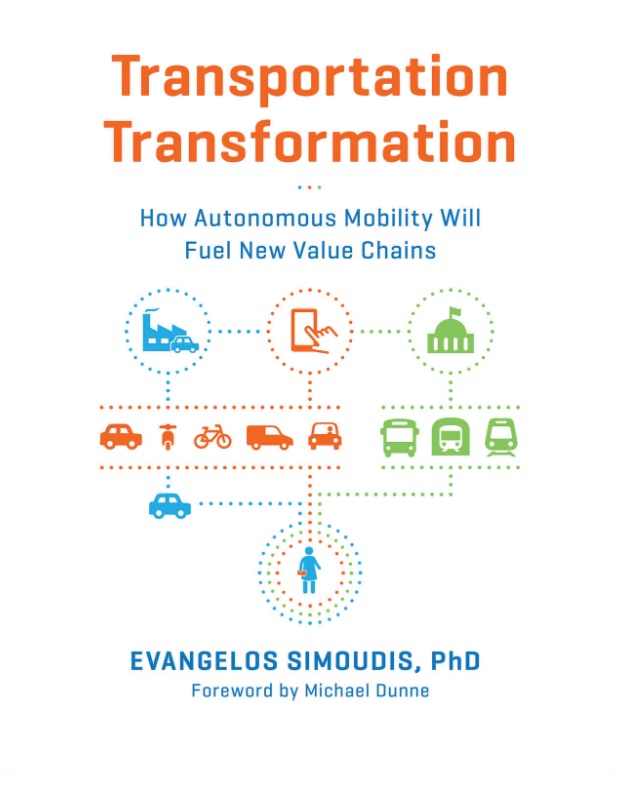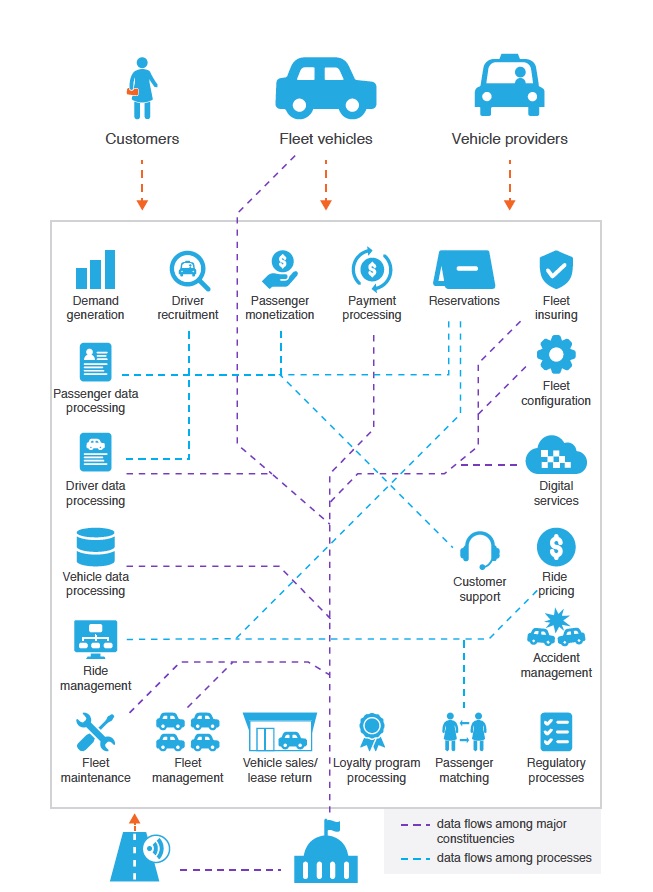“Transportation Transformation” is the definitive book on the future of mobility

Evangelos Simoudis has seen the future of transportation. His new book Transportation Transformation: How Autonomous Mobility Will Fuel New Value Chains is the most insightful analysis of the future of transportation that you’ll ever read.
Simoudis created this text based on exhaustive research over a period of years and connections with some of the most influential people in the automotive and transportation business, in established companies, startups, and government. It is a tour de force of analysis, which is a judgment I don’t make lightly after having spent 20 years as an analyst. I had a minor role in the development of this book, as editor.
What makes Transportation Transformation stand out?
The most important quality that makes Transportation Transportation unique is that is a comprehensive overview of the entire ecosystem of mobility.
The automakers have their own view of mobility, driven by their expertise in design, manufacturing, and marketing. The mobility services companies, like Uber and Lyft and Bird, have their own view. And it’s crucial to understand the role of government, because decisions made by urban planners and government regulators will have a massive impact on the direction of transportation’s future.
This is the only analysis I’ve seen that encompasses all of those factors. Furthermore, it’s global. Simoudis is just as comfortable addressing the future of transportation in India or Hong Kong as in Los Angeles or New York. His analysis spans not just passenger cars but goods delivery and mass transit.
Simoudis analyzes transportation’s future based on two angles. The first is based on shifts in behavior — the shift to treating mobility as a service, away from car ownership and towards transportation access. This is going on in parallel with a shift towards autonomous electric vehicles. The combination of these trends leads Simoudis to a startling conclusion: the future of urban transportation is a shift towards fleets of vehicles maintained and operated by services companies (some of which may be carmakers).
The second quality that makes this book visionary is its analysis of value chains. You cannot predict the future of anything unless you understand the economics of the new way of doing things. Simoudis deconstructs the simple value chains of today (carmaker assembles vehicles, ships to dealers, consumers buy and operate) and projects the far more complex value chains that will result from future fleets of autonomous and electric vehicles.

The rigor of this analysis is relentless. Simoudis explores — in detail, with many graphics — the future of carmakers, mobility services companies, and cities. He examines the masses of data that various players will collect and how they will monetize it. And he takes an objective and somewhat scary look at the risks associated with this shift.
Simoudis deserves credit for maintaining focus on the long-term, even as the COVID-19 crisis hit concurrent with the book’s publication schedule. It’s true that trends like telework will permanently alter some of the transformations described in this book, but the vision remains valid. Transportation Transformation is about the decades to come, not next month.
This is not a breezy piece of tossed off musing that you can read in a few days and forget. It’s not an easy book to read cover to cover, because the analysis is so dense and detailed. But if you making decisions regarding transportation — if you are an urban planner, a carmaker, a venture investor looking at transportation startups, or a voter who cares about cities, cars, public transit, and the future — you need a copy of this book. Whatever you’re thinking about, Simoudis has analyzed it. Heck, the index alone is 11 pages long.
Transportation Transformation belongs on the bookshelf of anyone who’s thinking seriously about the future of getting around.
So I follow your link and land on an Amazon page. The first thing that happens is a pop-up with the text:
“We ship internationally. We’re showing you items that ship to Netherlands. To see items that ship to a different country, change your delivery address. Additional language and currency settings are available.”.
Yes, I know that. I’m not dumb. This appears every time I don’t land on the Dutch Amazon site. I don’t want to change my shipping address. Klick and it is gone.
Then a new banner appears, “We are delivering to your region with limited shipping options. Please expect extended delivery time.”. Sigh, the page is about an E-book. Delivered by wire.
It would be nice if the web based companies not only cut the bullshit but also stopped treating their customers as idiots.
We’re not dumb.
We’ve heard from other readers that they are having problems with Amazon. As a result they have used other services. The book is also available in Kindle and Apple Books.
In the Netherlands there is a company that started leasing bicycles to students. Swapfiets.nl . It is a success. They are already expanding trough Europe.
If the bike breaks down, you just make a call and things get fixed in no-time.